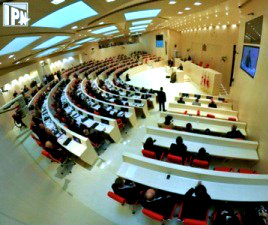
TBILISI, DFWatch–The ‘This Affects You Too’ campaign demands that parliament appoints a special session to review a package of amendments to better regulate secret surveillance and considers it ‘shameful’ that the assembly failed to reach a quorum last Thursday.
If parliament doesn’t appoint a session, ‘This Affects You Too’ might revive their campaign, which was suspended due to the upcoming local election on June 15.
Members of ‘This Affects You Too’ think it is concerning that a passage was removed from the amendments which made mobile operators have the access key to the servers, so-called black boxes, and not the Ministry of Internal Affairs. According to the NGOs, it is a common practice in Europe that mobile operators have the access key.
They failed to agree about this issue with the government. Parliament decided to separate the issue and discuss it in November. A commission with foreign experts will be created to make a recommendation regarding the so-called black boxes.
Lasha Tughushi, member of ‘This Affects You Too’, claims that the postponement will weaken the positive effect of the amendments.
Tughushi, who is editor-in-chief of daily newspaper Rezonansi, is co-author of the amendments package on secret surveillance together with MP Shalva Shavgulidze, from the Georgian Dream coalition, Zviad Koridze, a media expert, and lawyer Lika Sajaia, who is an employee at the parliament.
After the change of government in 2012, tens of thousands of surveillance files were discovered. Some of the footage containing private scenes was destroyed by decision of a special commission, the members of which were the minister of interior and the justice minister, judges, the chief prosecutor, the ombudsman and three activists, Eka Gigauri from Transparency International, Kakhi Kakhishvili from Center of Election and Political Technologies and Lasha Tughushi.
More than 100 files, spanning 200 hours, were destroyed, showing highly private situations of hundreds of people. These files were obtained during the Saakashvili regime.
Many people think the illegal surveillance is continuing. The question resurfaced when Rustavi 2, the last pro-Saakashvili TV company, released secret recordings of conversations between the current government and businessmen.
Government officials claim that these recordings were made by members of the National Movement who appropriated devices for secret surveillance after they lost posts at the Interior Ministry. The Interior Ministry said in a statement that some of its equipment for secret surveillance has disappeared.
Members of the National Movement say the government is listening to its political opponents, its own supporters and others, including journalists.
‘This Affects You Too’ also claims that despite the change of government, illegal surveillance is continuing and there must be taken real measures to prevent it. They think the best way out is to adopt package of amendments which foresees changes in five laws. The package was sent to parliament last year but the review of it has not yet started.
On Thursday, parliament should have started to review the bill, but there were not enough votes to pass it on the first hearing.
Eka Gigauri, Executive Director of Transparency International Georgia, says the package which parliament was about to review didn’t include one of the most important articles: who will have access to the material obtained by secret surveillance or the key to the black boxes.
Lasha Tughushi, co-author of the package, thinks it is shameful that parliament failed to pass such an important amendment due to a lack of quorum.
He thinks it is unacceptable to postpone the issue about access to black boxes until November.
“This is about very simple issues, whether we want a European approach or not,” Tughushi said.
“A European approach is that it doesn’t go to Interior Ministry bodies; a non-European approach is that the key goes to Interior Ministry bodies. They could perfectly find out how the system works in Europe. Europe is not on the moon and Mars and it was really easy to find this out.”
The bill sets out categories of persons and crimes for which secret surveillance is legal. It also strengthens institutional, legal and parliamentary control over such surveillance.

